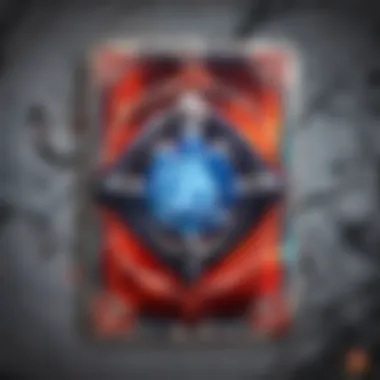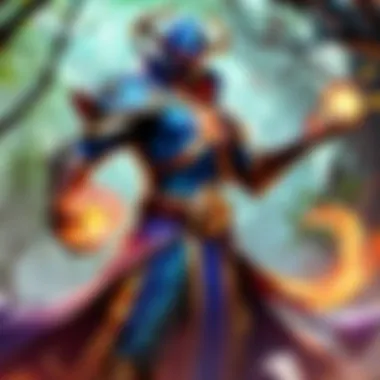Unveiling the Mastery of Flesh and Blood TCG Starter Decks for Strategic Gameplay


New Releases & Game Reviews
Evaluating newly released heroes, updates, or patches in Flesh and Blood TCG provides a fresh perspective on the evolving landscape of the game. Conducting in-depth analyses of new features or mechanics can elucidate their impact on gameplay dynamics. Comparing the current version with its predecessors unveils the progression and innovation within the game. Gauging community feedback and perspectives can offer a well-rounded view of the reception towards the latest releases. Keeping abreast of new developments ensures that you are at the forefront of innovation and prepared to adapt to the ever-changing gaming environment.
Introduction to Flesh and Blood TCG
Let us embark on a journey delving deep into the captivating realm of Flesh and Blood TCG. This article serves as a guiding light for players who seek to immerse themselves in the intricacies of this enthralling trading card game. As we unravel the layers of this game, it is paramount to understand the fundamentals that form the backbone of gameplay dynamics, deck construction techniques, and advanced strategic approaches. By mastering the core concepts introduced in this section, readers will be equipped with the essential knowledge required to elevate their gaming experience to new heights.
Understanding the Game Dynamics
Resource Management
Resource management stands as a pivotal element within the domain of Flesh and Blood TCG, influencing every decision and maneuver a player makes throughout the gameplay. The meticulous allocation of resources, be it mana, cards, or health points, determines the efficacy of strategies employed in combating opponents. The strategic deployment of resources can often be the differentiating factor between victory and defeat, showcasing its significance in shaping the outcome of each duel. While resource management offers unparalleled control and adaptability in one's gameplay, it also requires foresight and planning to optimize its potential fully. Finding the delicate balance between expenditure and conservation is key to harnessing the power of resource management within this strategic card game.
Combat Mechanics
Combat mechanics serve as the beating heart of Flesh and Blood TCG, dictating the flow of engagements and encounters between players. The nuanced intricacies of combat mechanics encompass a wide array of interactions, from initiating attacks to executing defensive maneuvers with precision. Understanding the interplay between offensive and defensive tactics is essential for mastering the art of combat within the game. While combat mechanics grant players the agency to outmaneuver opponents and seize advantageous positions on the battlefield, overlooking its complexities can prove detrimental to one's strategic endeavors. By embracing the strategic depth that combat mechanics offer, players can elevate their gameplay to a realm of tactical finesse and calculated decision-making.
Deck Building Strategies
Deck building strategies serve as the cornerstone of every successful player's repertoire in Flesh and Blood TCG, offering a canvas for creativity and ingenuity in formulating winning tactics. The art of constructing a well-balanced deck lies in synergizing complementary cards, balancing attributes for versatile gameplay, and adapting playstyles to exploit opponents' weaknesses. Deck building strategies provide players with a platform to express their strategic acumen and tailor decks to suit their preferred tactics. While deck building fosters a sense of individuality and strategic identity, it also demands a keen understanding of card synergies, metagame trends, and effective resource utilization. By honing their deck building prowess, players can craft formidable arsenals that are formidable, adaptable, and poised for victory.
Importance of Starter Decks
Role in Game Progression
Starter decks serve as the foundation upon which players build their journey in Flesh and Blood TCG, offering a gateway to the vast expanse of gameplay possibilities and strategic depth that the game embodies. The role of starter decks in game progression is instrumental, providing players with pre-constructed decks that lay the groundwork for advancing to more sophisticated strategies and card interactions. While starter decks offer a structured introduction to the game, they also serve as a springboard for players to experiment, learn, and evolve their gameplay approaches over time. Embracing the nuances embedded within starter decks allows players to grasp fundamental mechanics, card synergies, and strategic nuances that underpin success in Flesh and Blood TCG.
Building Blocks for Advanced Decks
Starter decks not only serve as introductory tools but also as the essential building blocks for constructing advanced decks that rival the complexity and diversity of seasoned players. The components within starter decks form the scaffolding upon which players can expand their card collections, experiment with new strategies, and refine their deck compositions to align with their evolving playstyles. Building blocks for advanced decks essence lies in the versatility and adaptability they offer, allowing players to transition from novice to adept seamlessly. While leveraging starter decks as building blocks, players can uncover hidden synergies, optimize card ratios, and tailor their decks to counter prevailing metagame trends effectively. The evolution from starter decks to advanced configurations signifies a player's growth, experience, and strategic maturation within the competitive landscape of Flesh and Blood TCG.
Value for New Players
For new players venturing into the realm of Flesh and Blood TCG, the value of starter decks transcends mere gameplay components; they symbolize a gateway to discovery, learning, and mastery. The inherent value of starter decks lies in their capacity to immerse players in the foundational aspects of the game, from understanding basic mechanics to experimenting with diverse strategies in a low-risk environment. As new players acclimate to the intricacies of gameplay, starter decks offer a safe space to refine their skills, unleash their creativity, and navigate the complexities of deck construction without overwhelming complexity. The value derived from starter decks extends beyond mere card interactions; it encapsulates the transformative journey of acquiring knowledge, honing skills, and forging a strategic identity within the vibrant tapestry of Flesh and Blood TCG.


Choosing the Right Starter Deck
Choosing the right starter deck is a critical decision that sets the foundation for your gameplay journey in Flesh and Blood TCG. The starter deck you select can significantly impact your experience and performance in matches. It serves as the initial toolkit that defines your strategies, card interactions, and overall approach to the game. By choosing a starter deck that aligns with your playstyle and preferences, you can enhance your enjoyment of the game and increase your chances of success. Factors such as card abilities, hero archetypes, and deck synergies play a pivotal role in guiding your choice of a starter deck.
Analyzing Card Abilities
In the realm of Flesh and Blood TCG, analyzing card abilities is a fundamental aspect of honing your gameplay skills. Card abilities dictate the actions and possibilities available to you during matches, shaping your tactical decisions and strategic maneuvers. Understanding the synergies among cards within a deck is crucial for maximizing their potential and creating powerful combos. Each card possesses unique attributes and effects that contribute to its overall value in gameplay. By dissecting and comprehending card abilities, players can craft decks that are not only efficient but also versatile, capable of adapting to various in-game scenarios.
Synergy among Cards
Synergy among cards is the harmonious relationship and cooperative interaction between different cards within a deck. This synergy enhances the effectiveness and impact of individual cards when played together, creating potent combinations that can turn the tide of a match. Building a deck with strong synergy among cards ensures smooth gameplay flow and enables players to capitalize on strategic opportunities efficiently. However, maintaining synergy among cards requires careful planning and consideration to avoid potential pitfalls or inconsistencies in gameplay.
Balanced Attributes
Balanced attributes refer to the distribution of characteristics, such as offense, defense, and utility, among the cards in a deck. Achieving balanced attributes ensures that a deck remains versatile and adaptable in diverse gaming situations. By incorporating cards with complementary attributes, players can cover their weaknesses and bolster their strengths, fostering a well-rounded gameplay approach. Striking a balance in attributes prevents reliance on a single strategy and enhances the deck's overall resilience and strategic capabilities.
Adaptability to Playstyles
The adaptability of a deck to various playstyles is essential for navigating the dynamic landscape of Flesh and Blood TCG. A deck with high adaptability can adjust its tactics and card usage based on the opponent's moves and game state, providing flexibility and unpredictability in gameplay. Players who prioritize adaptability in deck construction can seamlessly transition between aggressive, defensive, or control-oriented strategies, keeping their opponents guessing and maintaining strategic superiority throughout matches.
Exploring Hero Archetypes
Hero archetypes in Flesh and Blood TCG embody distinct playstyles and approaches to combat. Each archetype offers unique strengths and weaknesses, catering to diverse player preferences and tactical preferences. Understanding the characteristics and features of different hero archetypes is instrumental in selecting a starter deck that aligns with your preferred gameplay style and strategic inclinations.
Aggressive Warriors
Aggressive warriors excel in direct combat and overwhelming their opponents with brute force and relentless assaults. These heroes are adept at delivering high-damage attacks and pressuring foes with offensive maneuvers. Players who favor a straightforward and brawny playstyle may find aggressive warriors appealing, as they excel in punishing enemy vulnerabilities and maintaining aggressive momentum throughout battles.
Strategic Mages
Strategic mages epitomize cleverness and precision in their spellcasting abilities, utilizing a mix of offensive and defensive magic to control the flow of battle. These heroes excel in manipulating the battlefield, gaining tactical advantages through spell combos and trickery. Players who appreciate strategic planning and resource management may gravitate towards strategic mages, as they offer a nuanced and cerebral approach to combat, relying on cunning tactics to outwit opponents.
Versatile Rogues
Versatile rogues embody adaptability and resourcefulness, employing a mix of stealth, subterfuge, and quick strikes to outmaneuver adversaries. These heroes thrive in shifting circumstances, thriving on unpredictability and versatility to gain the upper hand in battles. Players who value agility, versatility, and calculated risks may find versatile rogues an enticing choice, as they offer a blend of strategy and cunning that keeps opponents on their toes and secures victories through clever gameplay maneuvers.
Deck Construction Techniques


Deck Construction Techniques play a pivotal role in shaping the outcome of games in Flesh and Blood TCG. Understanding the nuances of deck construction is crucial for players aiming to achieve mastery in the game. By intricately crafting the composition of their decks, players can strategically guide the flow of gameplay towards victory. In this article, we delve into the significance of Deck Construction Techniques, exploring their impact on resource management, action efficiency, and defensive versatility to empower players with the knowledge needed to attain strategic superiority.
Optimizing Card Ratios
Resource Distribution:
Resource Distribution within a deck is a critical element that influences the balance between various types of cards - be it resource-generating cards, combat-oriented cards, or utility cards. The strategic allocation of resources determines the fluidity of gameplay and enhances the deck's adaptability to diverse game scenarios. Effective Resource Distribution presents players with the opportunity to maintain a steady flow of strategic assets, enabling them to respond adeptly to opponent moves and seize advantageous positions on the battlefield. Despite its benefits, improper Resource Distribution may lead to inconsistencies in gameplay, hampering a player's ability to execute their intended strategies seamlessly.
Action Efficiency:
Action Efficiency refers to the optimization of card plays with minimal waste of resources. By ensuring that each action contributes significantly to the overall game plan, players can maximize the impact of their decisions on the battlefield. Maintaining high Action Efficiency allows players to outmaneuver opponents, capitalizing on key moments and exploiting vulnerabilities with precision. However, overly conservative plays in the pursuit of efficiency may also hinder a player's ability to seize unexpected opportunities, necessitating a delicate balance between efficiency and adaptability.
Defensive Versatility:
Embracing Defensive Versatility in deck construction equips players with the tools needed to weather opponents' attacks and counterplay effectively. Defensive cards serve as a bulwark against aggressive strategies, providing players with the resilience needed to survive prolonged engagements and turn the tide of battle. The versatility of defensive options enhances a deck's robustness, enabling players to adapt their defensive stance based on the evolving dynamics of the game. While a defensive-oriented deck offers stability and endurance, an excessive focus on defense may leave players vulnerable to fast-paced offensive assaults, demanding a judicious blend of defensive and offensive capabilities for optimal gameplay.
Sideboard Strategies
Sideboard Strategies introduce a layer of adaptability and customization to players' decks, allowing them to tailor their card selections based on specific matchups and prevailing metagame trends. By incorporating Sideboard Strategies into their gameplay repertoire, players can gain a strategic edge over opponents and forge resilient game plans that can withstand diverse tactical challenges. The art of sideboarding involves a deep understanding of the underlying mechanics of the game, meticulous analysis of opponent strategies, and the foresight to anticipate potential threats and opportunities on the battlefield.
Teching Against Meta:
Teching Against Meta involves the strategic inclusion of cards or strategies in the sideboard that specifically target prevalent decks or playstyles in the current metagame. By preemptively countering popular tactics or leveraging tech choices that exploit common vulnerabilities, players can outmaneuver opponents who rely heavily on established meta strategies. This approach requires a keen awareness of the meta landscape, adept deck-building skills, and the ability to adapt swiftly to emerging trends to maintain a competitive edge.
Countering Opponent's Tactics:
Countering Opponent's Tactics in sideboarding entails identifying and preparing responses to key aspects of an opponent's deck or gameplay style. By anticipating opponent moves and tailoring sideboard options to disrupt their critical strategies, players can disrupt their opponent's game plan and assert greater control over the battlefield. This strategic counterplay necessitates foresight, adaptability, and a profound understanding of opponents' tendencies, enabling players to pivot effectively between offensive and defensive tactics to secure victory.
Enhancing Deck Adaptability:
Enhancing Deck Adaptability through sideboarding allows players to augment their primary deck with supplementary cards that bolster specific facets of their strategies or shore up weaknesses against certain archetypes. By enhancing deck adaptability, players can pivot swiftly between different game plans, transform their playstyle on the fly, and confound opponents with unexpected maneuvers. However, excessive reliance on sideboard options may dilute the cohesion of the main deck, requiring players to strike a delicate balance between reinforcement and consistency to maintain a resilient and versatile deck construction.
Mastering Gameplay Tactics
In this section, we delve into the crucial aspect of Mastering Gameplay Tactics within the realm of Flesh and Blood TCG. Mastering gameplay tactics is not just about skill but also strategic thinking and adaptability. Understanding how to effectively navigate the gameplay dynamics can be the difference between victory and defeat in competitive matches. By honing these tactics, players can elevate their performance and outmaneuver their opponents with precision and foresight.


Gameplay tactics play a pivotal role in shaping the outcome of a match. It involves a deep understanding of card interactions, timing, and anticipating the opponent's moves. Mastering these tactics allows players to capitalize on opportunities, mitigate risks, and control the flow of the game. Whether it's initiating decisive attacks, executing defensive maneuvers, or optimizing card plays, every tactical decision influences the course of the game and contributes to a player's overall success.
Strategic thinking is at the core of mastering gameplay tactics. It involves analyzing the game state, anticipating potential outcomes, and strategizing accordingly. By strategically utilizing resources and abilities, players can adapt to changing circumstances, exploit their strengths, and capitalize on their opponent's weaknesses. A well-rounded grasp of gameplay tactics not only enhances a player's performance but also cultivates critical thinking skills and decision-making acumen.
Understanding Combat Sequences
Initiating Attacks
Initiating Attacks is a fundamental aspect of combat sequences in Flesh and Blood TCG. It is the strategic initiation of offensive maneuvers to reduce the opponent's health points and gain a strategic advantage. The key characteristic of Initiating Attacks lies in its ability to dictate the pace of the game and put pressure on the opponent. By launching calculated assaults, players can disrupt their opponent's plans and create openings for further strategic maneuvers.
Initiating Attacks is a popular choice for players seeking to seize control of the game early on and set the tempo in their favor. Its unique feature lies in its potential to dictate the flow of combat and force reactive responses from the opponent. However, Initiating Attacks also carry risks, as overcommitting to aggressive plays can leave a player vulnerable to counterattacks and resource depletion. Continued on next section
Advanced Deck Upgrades
Advanced Deck Upgrades play a pivotal role in elevating players' gameplay experience within the realm of Flesh and Blood TCG. In this section, we delve into specific elements, benefits, and considerations that underscore the significance of enhancing decks to meet evolving challenges. By investing time and resources in upgrading decks, players can unlock new strategies, counter emerging tactics, and stay competitive in the ever-changing landscape of the game. From optimizing card synergies to incorporating innovative tactics, advanced deck upgrades serve as the cornerstone for staying ahead of the curve in the metagame.
Metagame Analysis
Adapting to Current Trends
Adapting to Current Trends is a strategic maneuver that empowers players to remain adaptable and responsive to prevailing strategies. This approach allows players to anticipate opponent moves, capitalize on emerging tactics, and strategically pivot their deck compositions for optimal performance. The key characteristic of Adapting to Current Trends lies in its ability to provide players with a competitive edge by staying attuned to the pulse of the metagame. While this strategy offers benefits such as increased versatility and adaptability, it also poses challenges in predicting the longevity of trend shifts and efficiently implementing reactive adjustments.
Incorporating New Releases
Incorporating New Releases involves integrating the latest card additions into existing decks to harness their potential advantages. This practice enables players to explore fresh synergies, capitalize on novel abilities, and create unique playstyles that can catch opponents off guard. The primary allure of Incorporating New Releases lies in its capacity to introduce unpredictability and dynamism into gameplay, fostering innovation and creativity among players. However, this strategy demands a keen understanding of card mechanics, strategic foresight, and a judicious balance between experimentation and stability within deck compositions.
Predicting Future Strategies
Predicting Future Strategies necessitates foresight and analytical prowess to anticipate the direction of the metagame and plan proactively. This skill enables players to position themselves strategically, preempt potential shifts in gameplay trends, and tailor their decks to preemptively counter emerging strategies. The distinctive feature of Predicting Future Strategies is its emphasis on long-term planning, risk assessment, and adaptability, allowing players to stay ahead of competitors and cultivate a competitive advantage. While this approach empowers players to shape their gameplay trajectory, it also demands comprehensive game knowledge, strategic acumen, and a willingness to iterate based on predictive insights.
Competitive Play Tactics
Tournament Preparation
Tournament Preparation is a critical aspect of competitive play that involves meticulous planning, practice, and mental readiness for high-stakes gameplay scenarios. This preparation encompasses honing specific strategies, refining gameplay mechanics, and mastering card interactions to perform optimally in tournament settings. The key characteristic of Tournament Preparation lies in its capacity to instill confidence, focus, and resilience in players, enhancing their overall performance and adaptability under pressure. While this tactical approach offers advantages such as strategic clarity and mental fortitude, it requires dedication, discipline, and a commitment to continuous improvement to excel in competitive environments.
Matchup Strategies
Matchup Strategies revolve around analyzing opponent archetypes, identifying strengths and weaknesses, and tailoring gameplay approaches to exploit strategic advantages. This tactic empowers players to adapt their tactics dynamically, assess situational nuances, and strategize effectively to outmaneuver adversaries. The primary allure of Matchup Strategies rests in its emphasis on versatility, adaptability, and strategic decision-making, fostering a nuanced understanding of gameplay dynamics and opponent psychology. However, mastering Matchup Strategies demands flexibility, attentiveness, and a willingness to iterate tactics based on evolving matchups and gameplay conditions.
Mind Games and Bluffs
Mind Games and Bluffs involve psychological maneuvers, misinformation tactics, and strategic deception to outwit opponents and manipulate gameplay outcomes. This strategy relies on creating illusions, bluffing card plays, and eliciting erroneous responses from adversaries to gain a strategic advantage. The key characteristic of Mind Games and Bluffs is its focus on psychological warfare, player manipulation, and strategic misdirection to sow doubt and uncertainty in opponents' decision-making processes. While this tactic can be a formidable tool for gaining a psychological edge, it necessitates astute judgment, psychological acumen, and a deep understanding of opponent tendencies to execute successfully and avoid backfiring.



